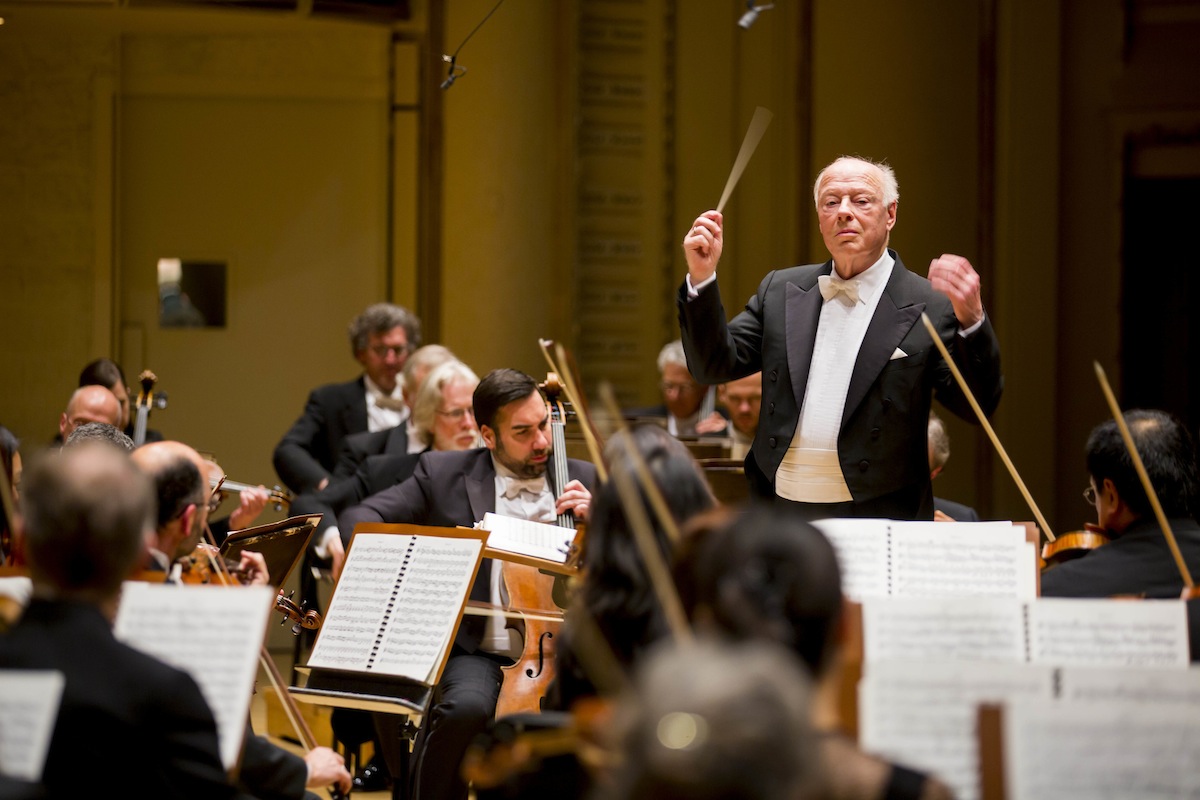Haitink, CSO deliver majestic and eloquent Bruckner

There’s a thesis waiting to be written about why Mozart and Bruckner make such companionable program mates. The two Austrian composers certainly provide bracing contrast with Mozart’s Classical purity and light, spirited style a fine foil to Bruckner’s epic canvases and roaring brass chorales.
With Bernard Haitink back on the podium, the Chicago Symphony Orchestra offered a program of Mozart and Bruckner Thursday night at Symphony Center, with the highlight a majestic performance of Bruckner’s Symphony No. 4 that must count as a highlight of the season.
In his first CSO appearance in a year, Haitink, who will turn 85 in March, looked fit and healthy. The Dutch conductor sat briefly on a stool between the second and third movements but otherwise brought admirable vigor and characteristic focus to Bruckner’s 66-minute journey.
CSO audiences have been fortunate with performances of Bruckner’s “Romantic” symphony—a designation that can be equally applied to all of the composer’s works in the genre—with Kurt Masur leading an inspired rendering of the Fourth on the same stage two years ago.
The CSO’s former principal conductor is justly lauded in a large swathe of repertory, yet I’m not sure there is a composer in whose music Haitink is more authoritative than that of Anton Bruckner. Haitink’s textual integrity, sobriety of approach and eschewing of excess pay great dividends in Bruckner’s symphonies, vast sonic cathedrals which, in lesser hands, can easily tip over into disorder and noisy overkill.
Haitink’s patient approach is the antithesis of surface thrills, his measured yet holistic pace through the peaks and valleys unfolding with a sense of inevitability. The opening with its mysterious tremolo strings had the requisite atmosphere of mountain mists lifting. Acting principal Daniel Gingrich lofted a gorgeous horn solo to lead into the ensuing brass fanfare, which was tensile and impeccably blended without any hint of rawness.
What one noticed most in the long opening movement was the almost Rococo refinement of the playing drawn by Haitink. The lilting second theme had a Haydenesque lightness and the ensuing melody for strings a reflective intimacy. Brass eruptions were powerful yet deftly avoided bombast, feeling well earned for Haitink’s steady direction.
Rarely will one hear the contemplative quality of the Andante resonate with such sure yet subtle impact. The music flowed with grace and logic, Haitink’s terraced dynamics emerging organically without ever seeming pedantic. The brass had enviable heft in the Scherzo’s hunting melody yet the contrasting sections went with a wonderful rustic charm, the winds piquant and delightful in the Landler-like trio.
Even accomplished Bruckner hands can become lost in the Fourth’s somewhat discursive finale. But here the performance by Haitink and the orchestra really rose to the occasion with Bruckner’s byways–even if there is one too many—allowed time to blossom, as Haitink built to a resonant coda with a natural unforced eloquence and sense of cumulative rightness.
The playing Thursday night was on the highest level across all sections with the musicians clearly happy to have Haitink back and responsive to his direction. Along with Gingrich’s evocative horn playing, woodwinds were especially fine with stellar contributions from flutist Mathieu Dufour, oboe Eugene Izotov and clarinetist Burt Hara, associate principal of the Los Angeles Philharmonic, who is sitting in this week. Timpanist David Herbert once again showed what a superb addition he has been to the orchestra, bringing a remarkable dynamic range and expressive nuance to his playing.
The evening began with Emanuel Ax in Mozart’s Piano Concerto No. 27, which was being heard for the third time at CSO downtown concerts in as many years. Isn’t it time to program one of Mozart’s other 26 concertos for a change?
Ax is a popular and well-regarded hand in this repertoire and showed his usual nimble articulation and assured sense of Mozart style. The pianist was at his best in the finale, where Ax’s amiable bonhomie suited the buoyant child’s-song-like main theme, which skipped along with characteristic joie de vivre.
But in Mozart’s final work in the genre, those looking for something deeper were likely to be disappointed. The soloist’s one-size-fits-all Mozart approach barely hinted at the darker shadows in this music, and one missed the inward expression and degree of dynamic detailing Mitsuko Uchida routinely brings to this score. Ax’s blandly untroubled playing of the Larghetto’s spare main theme was all on the surface, with little sense of the music’s searching, valedictory expression.
The program will be repeated 8 p.m. Friday and Saturday and 3 p.m. Sunday. cso.org; 312-294-3000.
Posted in Performances





Posted Nov 02, 2013 at 2:57 pm by Brad
Daniel Gingrich’s horn playing has been consistently amazing. I wish the Orchestra could remove “Acting” from his title and let him continue in the first chair for the long term.
Posted Nov 04, 2013 at 8:14 am by Lillian
Your review nailed it with regard to Thursday’s performance. If there are two (let alone one) conductors who can lead the CSO in raising its already-high bar, it’s Haitink and Muti, and the results are always astounding. (P.S. ditto what Brad said)